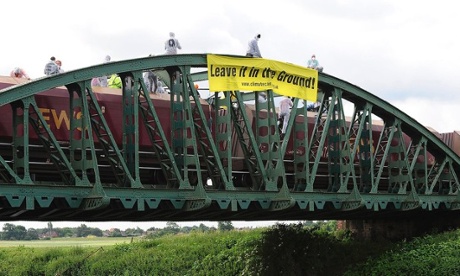
It was an interesting day in the Court of Appeal last week. Twenty-nine of us had our convictions for obstructing a train carrying 42,000 tonnes of coal to Drax power station overturned after the judge ruled that crucial evidence about the role of undercover police officer Mark Kennedy had been withheld.
This latest chapter in the undercover policing revelations shows that issues of transparency, accountability and fairness remain absent from the UK's secret police force – currently operating under its newest acronym the NPOIU - National Public Order Intelligence Unit.
The court heard how Mark Kennedy had attended a briefing the night before the Drax action on 13 June 2008, listened to health and safety briefings and driven our group to the protest the following morning. None of this evidence however, was disclosed to the Jury in our crown court trial in 2009.
Lord chief justice Thomas raised some pertinent questions during the Appeal; namely who had been responsible for this “total failure” to disclose? Was it West Yorkshire Police, the CPS or the prosecution counsel? Speaking for the prosecution, Brian Altman QC who reviewed the original case, said that all three parties had given differing explanations.
The comments of the chief justice raise wider questions about the how the police deal with public scrutiny. Reading through the heavily redacted notes detailing communications in the hours leading up to the coal train protest between Mark Kennedy, his police handler and superior officers, the judge asked Altman: “Who authorised these redactions? We are being asked to quashed a set of convictions based on police misconduct....The police themselves must not redact their own documents.”
Tales of police cover-ups will be familiar to anyone who has followed the efforts of campaigns for justice against the police, notably the families of Stephen Lawrence and the victims at Hillsborough. The lesson to be drawn, as the judge's comments seem to support, is that the police cannot be trusted to investigate themselves.
Separately, a mis-representation in much of the media last Tuesday was that the former Director of Public Prosecutions, Keir Starmer, invited the Drax defendants to appeal their convictions in 2012 rather than being forced to agree with an investigation by campaigners and lawyers that our convictions could be unsafe. The danger in this presentation of gracious benevolence is that it gives the impression that the CPS can put their own house in order.
In fact, the opposite is true. Since Mark Kennedy was exposed publicly in October 2010, there have been around 17 inquiries or reviews into undercover policing, some of which are listed here. The general pattern is that a new revelation of underhand or immoral tactics (such as the stealing of dead children's identities or spying on the family of Stephen Lawrence ) is exposed and the police respond with an inquiry. Even the minority of those which are not self-investigations have been conducted by satellite bodies such as the Independent Police Complaints Commission – who are under-resourced and have regularly shown an institutional bias in favour of the police.
Sir Christopher Rose's 2012 report into the lack of disclosure between Nottinghamshire Police and the CPS during the trial of 20 protesters who planned to shut down Ratcliffe-on-Soar power station found that the failures in this case were “individual, not systemic.”
Yet history suggests otherwise. This week, three media organisations argued that Southwark Crown Court explicitly state its reasons for quashing the conviction of another activist, John Jordan, in October 2013. The case has been adjourned. Jordan's original trial in 1997 allegedly involved one of his co-defendants – former undercover officer Jim Boyling – giving evidence at Horseferry Road magistrates court under his false identity.
This would have allowed the police access to confidential legal advice from the defendant's lawyers and again, none of this was disclosed. Taken with the Drax case involving West Yorkshire Police, this shows that these are not isolated 'individual' failures. They have occurred in separate police forces, in different decades with separate parts of the CPS – in other words, it could well be 'systemic'.
These are just the cases that we know about. How many other potential miscarriages of justice are out there? The latest inquiry, Operation Herne, led by Derbyshire's Chief Constable Mick Creedon, has been running since October 2011 – yet 75% of its staff are Metropolitan Police employees and there is not even a guarantee that the findings will be published.
The former director of public prosecutions said he would look into any specific cases raised, rather than go looking for them. However, we cannot raise these potential cases since we don't know who the undercover cops are – or the trials they have been involved in. The police are the ones who do know, however.
This is why we are joining the call for an independent public inquiry to fully investigate undercover policing – including its collusion with blacklisting companies, the spying and attempted smearing of the Lawrences and the use of sexual relationships to gain trust amongst activists.
Until then, the view that the Britain's secret police are primarily concerned with controlling and stifling political dissent – at any cost to the public purse, the legal system or people's lives – will remain compelling.
• Robbie Gillett is one of the acquitted campaigners who took part in the 2008 Drax protest

